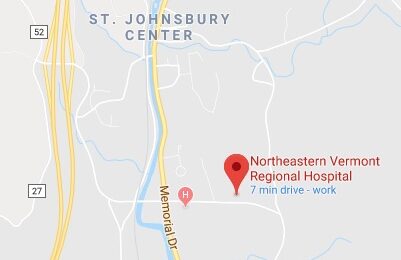Is It Seasonal Allergies or COVID-19?
How to tell the difference
It’s mid-April, and some of you may have noticed you’re starting to cough and feel a bit short of breath. Normally, you wouldn’t worry because you know that these symptoms are just your seasonal allergies. But with the novel coronavirus, or COVID-19, pandemic sweeping across the nation and the world, how can you be sure this year?
COVID-19 is a respiratory illness that can spread from person to person, according to the Centers for Disease Control and Prevention (CDC). The virus is thought to spread mainly between people who are in close contact with one another (within about 6 feet) through respiratory droplets produced when a person who has COVID-19 coughs or sneezes.
Patricia Launer, RN, CPHQ, Northeastern Vermont Regional Hospital Director of Quality/Infection Preventionist, said common symptoms of COVID-19 are fever, cough and shortness of breath.
To help protect yourself from the virus, the CDC recommends to avoid close contact with people who are sick, avoid touching your face without first washing your hands, and wash your hands often with soap and water for at least 20 seconds. If you don’t have access to soap and water, use an alcohol-based hand sanitizer that contains at least 60 percent alcohol.
There is no specific antiviral treatment for COVID-19, according to the CDC, but people with COVID-19 can seek medical care to help relieve symptoms. If you think you were exposed to COVID-19, you should call your doctor and stay home except to get medical care.
“The most important thing that people can do to prevent the spread of COVID-19 is to practice social-distancing,” said Launer. “It is hard, especially with spring beginning to happen all around us – but the way this virus moves is person-to-person. So if you are with someone who has it, and then you get it, you can spread it to the next person that you have contact with, sometimes before you even know that you are sick.”
In Vermont, seasonal allergies to tree pollen often begin in April; allergies to grass or weed pollens often begin to appear later in the summer.
The Allergy & Asthma Network describe seasonal allergies as a reaction that often causes inflammation when the immune system treats normally harmless proteins like plant pollen, pet dander or dust mites as if they were “dangerous invaders.”
“Unlike the COVID-19 virus, airborne allergy symptoms do not include a fever, and only occasionally include chest discomfort,” said Launer.
Although allergies share symptoms similar to COVID-19, such as shortness of breath and cough, people also may experience itchy, running nose with sneezing and coughing; itchy, watery eyes and redness; itchy, sensitive skin, rash or hives and swelling; and chest tightness, according to the Allergy & Asthma Network. Allergies cannot be spread from person to person.
“If you know what your allergy triggers are, try to avoid them,” Launer advised. “If that isn’t possible, then contact your doctor to get ideas of how best to treat them.”
We want to hear from you! Are there health topics or issues that you’d like to read about in an upcoming Vital Signs? Email us your suggestions at vitalsigns@nvrh.org, or mail them to NVRH, c/o Katie Bocchino, P.O. Box 905, St. Johnsbury, VT, 05819.
Sitemap | Privacy Policy | Site developed by Flek, Inc.
Northeastern Vermont Regional Hospital © 2020

